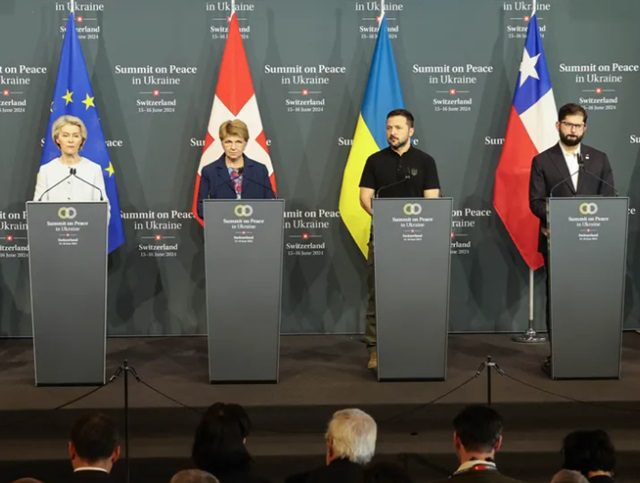BTN News: With the world increasingly on edge, Switzerland has called its first-ever peace summit for Ukraine to drum up a reset. At the event, ranging from June 15-16, about 100 countries and international organizations took part. However, Russia and China – countries with major interests vested in the war in Ukraine – were conspicuously absent.
Swiss Foreign Minister Ignazio Cassis also insisted that Russia and China should be involved, even though they stayed away. Cassis further underlined Switzerland’s role as a permanent neutral nation in maintaining diplomatic relations with Moscow, noting that he continued to have regular conversation with his counterpart, the Russian foreign minister. He also added that he would like to talk to Russia and other absent countries such as China about the results of the summit.
Participants planned to use the event to devise a peace plan that is expected to be presented to Russian officials at a possible second summit, according to Ukraine’s Presidential Office. The effort, in this case, reflects Switzerland’s belief that any future peace process must include Russia, even though Moscow was disinvited from the first conference.
The summit is taking place in a complex geopolitical environment. Under President Vladimir Putin, Russia has demanded that Kyiv pull back from a number of regions — demands Vaessen said Kyiv has flatly rejected. The timing of Putin’s invite, Michel’s plan to travel ahead of the trip that have mirrored U.S. intentions of reevaluation, and the International Criminal Court’s (ICC) only recently issued arrest warrants for Putin cloud any new diplomatic initiatings.
The lack of Chinese attendance in the summit – evidently over Ukraine’s efforts to reach out to Beijing – is consistent with broader geo-political propensities. Presenting a separate peace initiative with Brazil, Beijing has tried to play a diplomatic role in the region while dismissing the conditions of a summit hosted by Switzerland.
The summit has implications beyond immediate diplomatic goodwill. While full of hurdles and exceptions, Switzerland’s diplomatic attempts suggest a willingness to persevere with dialogue and the rule of law. Whether a second summit – heavily reliant on delicate diplomatic dance floors with China and Russia – actually comes to pass remains the ultimate object of scrutiny around the world.
In these diplomatic waters, the position of an honest broker like Switzerland is more important than ever. The results of their peace initiatives can offer a sort of template for diplomacy in the Eurasian region in years to come – war banners can be excused for this new diplomatic course, transition to the next geopolitical block and the modalities for a post-conflict world.
This event underscores the complexities within diplomatic policies behind the scenes and the need for broad-based peace processes in the face of widescale global geopolitical tensions. The involvement of countries fouled up like Russia and China in this is the indication of some sort of diplomatic process was never quite out of hand despite initial exclusions which influence the future of peace in the region.


